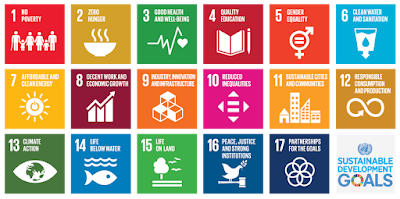 |
| SDGs as the guidelines of global empowerment |
The philosophical approach of the industrial revolution 4.0
According to the historical aspect, the beginning of industrial evolution was conducted in western society. It was the United Kingdom’s (UK) communities who had started the revolution throughout their transformations by changing the biological energy into machinery. This event has changed the views of people in conducting the social activities which lead to certain social conflicts. We cannot avoid that during the first stage of revolution, many social issues have been emerged among societies, and all of them have been connected to the way we live.
One of the most significant impacts that have been becoming the global issues is the environmental problems. Global warming and climatic change have been affected the global-related activities, for instance the food and agriculture, industrial sectors, and economic growth. People involving to these sectors have been trying to get out from these problematic issues. To solve these problems by analyzing the problems, doing research, and implementing the solutions based on the research. However, only certain communities have succeeded to manifest these solutions.
So, what is the industrial revolution 4.0? As it is explained primarily that the first stage of industrial revolution in the UK resulted environmental problems, the next phases of the revolutions have been considered to be produced certain-related problems. In the next revolutions, large scale productions supported by high demands of energy with the integration of automatic computerization systems have been conducted ever since the presence of technological advancements. However, these systems still produce the same issue which is the unfriendly environmental.
Therefore, the industrial revolution 4.0 is pointed out to design systems which our suitable to our biological factors. The biocompatibility reasons must be becoming the basis of policies or solutions, and this approach is popular with the name of sustainable.
Moving on from MDGs to SDGs
The declaration of the United Nations in September 2000 produced the program called as Millennium Development Goals (MDGs) which has been becoming the pioneer of global movements. However, the MDGs project was published to solve certain social issues such as child mortality and maternal health as well as the eradicating of poverty and global hunger. It seems that these policies were not completely success for global as in January 2016, the UNDP issued the Sustainable Development Goals (SDGs). So, what are they?
When the MDG achievements, such as the decreasing of mortality, had been conducted, the environmental problems are getting higher and higher. The increasing of global temperatures in certain parts of the world has been considering as the grand issue. As a result, the SDGs project which is started with the term “No Poverty” is interconnected to other specific problems such as hunger, health, education, equality, energy and legal. The 17 global projects must be able to be transformed into practical projects, such as what Ethiopians have been doing in the last decade.
To be concluded, with the rising of tension during the political year of Indonesia, the misunderstanding in defining the industrial revolution 4.0 is the key for developing the nation. With the support of cultural and religion factors, the vision of the future Indonesia indicated by the long-term solutions guided by the UN will become the holistically solutions. And what are they?